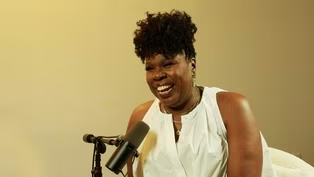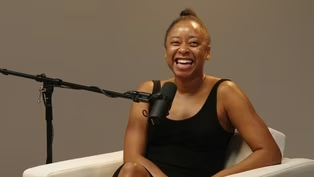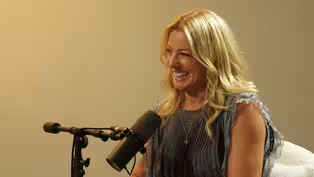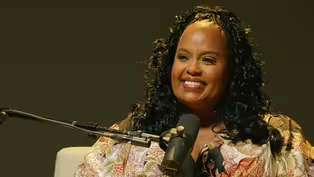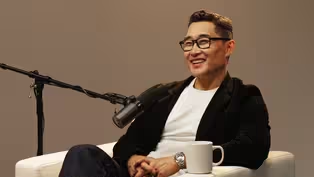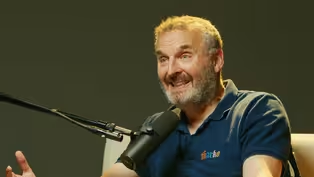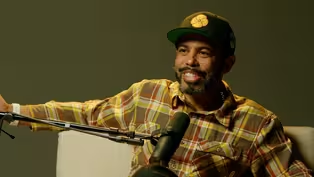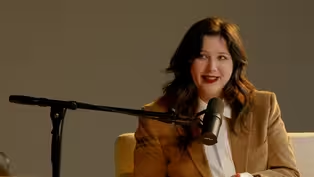
Tunde Adebimpe Channels His DIY Roots Into Raw Solo Debut
Special | 37m 28sVideo has Closed Captions
Musician Tunde Adebimpe on his creative process behind his solo album debut.
TV on the Radio co-founder Tunde Adebimpe talks about his creative process behind his solo debut album, Thee Black Boltz.
Problems playing video? | Closed Captioning Feedback
Problems playing video? | Closed Captioning Feedback
Support for American Masters is provided by the Corporation for Public Broadcasting, AARP, Rosalind P. Walter Foundation, Judith and Burton Resnick, Blanche and Hayward Cirker Charitable Lead Annuity Trust, Koo...

Tunde Adebimpe Channels His DIY Roots Into Raw Solo Debut
Special | 37m 28sVideo has Closed Captions
TV on the Radio co-founder Tunde Adebimpe talks about his creative process behind his solo debut album, Thee Black Boltz.
Problems playing video? | Closed Captioning Feedback
How to Watch American Masters
American Masters is available to stream on pbs.org and the free PBS App, available on iPhone, Apple TV, Android TV, Android smartphones, Amazon Fire TV, Amazon Fire Tablet, Roku, Samsung Smart TV, and Vizio.
Buy Now
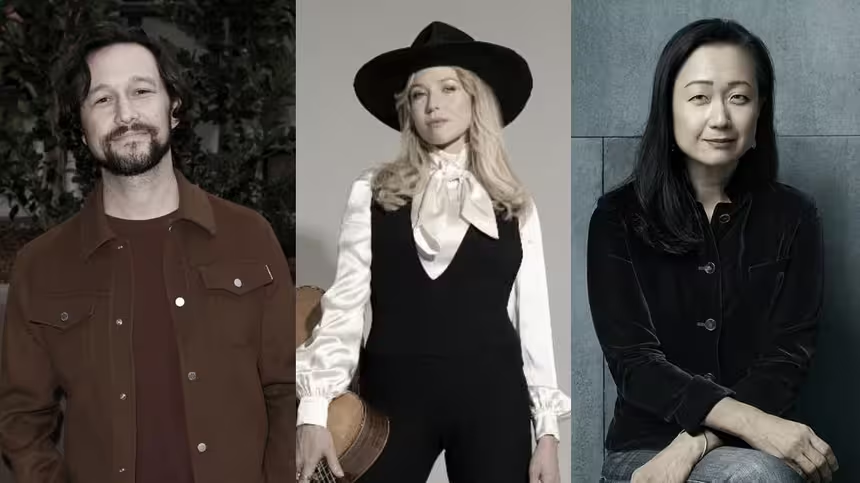
A front row seat to the creative process
How do today’s masters create their art? Each episode an artist reveals how they brought their creative work to life. Hear from artists across disciplines, like actor Joseph Gordon-Levitt, singer-songwriter Jewel, author Min Jin Lee, and more on our podcast "American Masters: Creative Spark."Providing Support for PBS.org
Learn Moreabout PBS online sponsorshipMore from This Collection
How do today’s masters create their art? "Creative Spark" presents narrative interviews that go in-depth with an iconic artist about the creation of a single work. Each episode offers a unique window into the world of art and the creative process of artists and cultural icons across a wide range of disciplines, from music and comedy to poetry and film.
How Leslie Jones Became a Comedian
Video has Closed Captions
Comedian and actress Leslie Jones does a deep dive on her creative process. (31m)
Phoebe Robinson Shows Her Work
Video has Closed Captions
Comedian Phoebe Robinson takes on hustle-culture in biting comedy special. (31m 45s)
Sarah McLachlan: Making Music to Connect and Heal
Video has Closed Captions
Singer-songwriter Sarah McLachlan opens up in a candid interview about making music. (37m 19s)
How Natasha Rothwell’s Life Brought Her to “The White Lotus”
Video has Closed Captions
Actress Natasha Rothwell on her creative process in "The White Lotus." (33m 40s)
Daniel Dae Kim Leads Spy Drama and Fights for Industry Change
Video has Closed Captions
Actor Daniel Dae Kim on his groundbreaking career and new project, "Butterfly." (21m 48s)
Phil Rosenthal’s Secret Recipe: Good Food and a Laugh
Video has Closed Captions
TV writer and host Phil Rosenthal talks about finding our shared humanity in food and comedy. (22m 53s)
Daveed Diggs Takes on Cyberpunk Rap
Video has Closed Captions
Rapper and actor Daveed Diggs on his creative process as a rapper and songwriter. (25m 28s)
Lucy Dacus Makes Her First Loves Songs
Video has Closed Captions
Singer-songwriter Lucy Dacus talks about love songs for her new album, "Forever is a Feeling." (23m 49s)
Providing Support for PBS.org
Learn Moreabout PBS online sponsorship- Would you say that art for you is about personal expression, or is it about trying to communicate something to others, or something in between that?
- I think it's in between that.
I think it's...
I feel like art or literature or music can be an attempt to organize a really, to organize the world, in a good way to put your messy feelings or not so messy feelings in a place, in a way that makes sense to you.
And I think that part of it can be the personal expression of, I am reacting to all of these elements of me moving through life.
And this is how I gotta make sense of it, because it honestly doesn't make a lot of sense, you know, grand scale.
And if my personal experience and the way that I've organized these thoughts or disorganized these thoughts is helpful to anyone else, I think that's a great thing.
And I think if there was a mindset of everybody having some kind of artistic practice or that was normalized where you can, it's fine for you to take a few seconds or a couple minutes a day to sit there and doodle and draw or write down what you're thinking and put it in a place, even if it's not something you share with anyone.
I feel like it's pretty therapeutic.
And the more you do it, the more it becomes a document of your life.
And maybe something in there is gonna be helpful to someone else, you can connect with someone that you might never meet and help them out in a way.
(indie music) - Hey, I'm Joe Skinner and this is "American Masters' Creative Spark."
In each episode, our guest breaks down their creative journey behind a single work of art and the sparks that led them here.
Today I spoke with musician, singer, songwriter, actor and visual artist, Tunde Adebimpe.
You might know Tunde's work as the co-lead vocalist for the legendary indie rock band TV On The Radio, a band he's been with for nearly 25 years across five studio albums.
And Tunde's back now with new music, with his debut solo album, "Thee Black Boltz."
♪ I was thinking about my time in space ♪ ♪ I was thinking about the human race ♪ ♪ In the age of tenderness and rage ♪ ♪ Have me kicking through the end of days ♪ - Something about Tunde's work always feels handcrafted and personal.
The theme of this episode's gonna be DIY and how a do-it-yourself ethos can start your career, but it can also stick and stay through decades of output.
♪ Magnetic, dope synthesizer ♪ ♪ You've been down but you're gonna get higher ♪ ♪ I know the skill of doin' loops in the fire ♪ ♪ What they gonna do with a lightnin' rider ♪ - I love when artists come from a DIY background.
The values it instills, and I just wanna hear from you like, what does DIY mean to you?
- DIY to me means you can create your own media without the go ahead from someone established.
Yeah, just something that seems like a traditional route of media.
And for me, I came to DIY culture as a teenager in Pittsburgh going to, you know, comic stores first, where I first found out about zines.
And I was in Pittsburgh and I found zines that came from Seattle Pacific Northwest, some from New York, but there was a real punk subculture.
So you would find out in these zines about underground bands that you wouldn't find out about otherwise.
You would have sort of male order pages in the back where somebody would send you a tape of their band, and their band would've made 60 tapes of their basement recording.
And you could get those via mail and you could make your own tapes.
And it was kind of like a, could be sort of like a pen pal, you know, circuit nationwide sometimes.
But it was just about being able to make your own stuff and finding a community within that of artists and musicians and writers, and basically not being given a go ahead.
Like you didn't need a publisher, or a record label, or even a gallery to say, you're qualified to do this.
- In the early 2000s, Tunde's band TV On The Radio found success through this model.
They came up in the New York indie scene of the era alongside bands like, Yeah Yeah Yeahs, LCD Sound System, and The Strokes.
A lot's been written on this period, but needless to say, TV On The Radio was one of the bands bringing back rock at a time when it was thought to be dead.
Their highest charting single 2006 is "Wolf Like Me," is certified gold.
♪ But I bet we wouldn't get too far ♪ ♪ Before the transformation takes ♪ ♪ And blood lust tanks and crave gets slaked ♪ ♪ My mind has changed ♪ ♪ My body's frame, but, God, I like it ♪ ♪ My heart's aflame ♪ ♪ My body's strained, but, God, I like it ♪ - The first piece of music we put out under the name, TV On The Radio, it was just myself and Dave Sinek.
And we had met because he moved into a loft I was living in, in Williamsburg with 10 other people.
We were all paying a hundred dollars a month because we all wanted to make art and not have regular jobs.
But he moved in and we both discovered that we had a lot in common.
We were both painters and we had all of these 4-track tapes of things that we'd made individually, and we'd play the tapes for each other and eventually decided, oh, we should make a compilation of this.
And we got the name, TV On The Radio, and we burned maybe a hundred CDs and silk screen the covers of these CDs covers.
And then we went to thrift stores and would hide them in bookshelves and furniture.
But that was very much the making 4-track tapes and sending them as a very DIY thing to do, making these copies, burning these CDs.
- That first demo album was self-released in 2002, its title is a play on the Radiohead album, "Ok Computer," it's called "Ok Calculator."
Here's my favorite from that extremely DIY record called "Yr God."
♪ Miracle hour, I've got the power ♪ ♪ I want to be your God ♪ ♪ Eleven to eleven, leaven to heaven ♪ ♪ I want to be your God ♪ - When it turned into a job, the thing that might've carried through in terms of ethos was just not caring what a mainstream audience would think, or not even thinking about a mainstream audience and just kind of making a mess.
And if it sounded good to us, that was better than good enough.
It was sort of like, this is messy, this is janky, it's got our fingerprints all over it.
And I think that was about it.
And we also...
I would art direct art for most of the records, where I would direct videos for us, but it was really this feeling of don't leave anything to anyone else if you can do it yourself.
(indie music) - I love to see how a musician's sonic palate translates to their visual work.
Tunde provides art direction across most of the TV On The Radio albums.
He has paintings and galleries and even published tour sketches from his time on the road.
He even created the artwork for the album cover for this new album, "Thee Black Boltz."
I think the marriage that I see often between comics and music is fascinating.
I think of Fort Thunder and Brian Chippendale, Lightning Bolt, bands like that.
- Yeah.
- So I was curious, when you were first exploring comics, who were the major artists you were looking to and how did that kind of spark your creativity?
- Well, I was really, from a young age was very into superhero comics.
And even like Archie and Harvey comics, I lived in Nigeria.
And the only comics that we would get there, you know, we would get Marvel and some DC, there were also British comics.
I remember there was a comic called "The Beano" and "The Dandy," which were more kind of cartoony.
And I remember going to a comic store in Pittsburgh called Phantom of the Attic.
And I remember going in one day and there was a comic, an anthology called "Drawn and Quarterly," and there were a lot of creators in there who were doing autobiographical comics.
An artist named Joe Matt did these autobiographical comics that were really embarrassing, down to just to his like sexual proclivities and just like, how much of a loser and like messed up person he was.
And I thought that was really interesting 'cause I didn't know that you could write an autobiographical comic.
So that kind of got to me.
There was an artist named Maurice Vellekoop who did these really beautiful watercolor comics, and he's a queer-gay artist.
And that was, I think, one of my first exposures to just realizing you could use comics to document your personal experience.
And, you know, working backwards, I found out about Robert Crumb and Art Spiegelman, and Dan Clowes and Chris Ware, and the artists like Phoebe Gloeckner, and Mary Fleener, just people who really had kind of a punk ethos of, again, like no one's asking for permission.
And these weren't like, really manicured comics.
And, you know, you're reading something and you're kind of like, oh wow, people are cursing and this person's naked.
And wow, I can't believe this is the comic.
I have to hide when my parents come in, just like, I gotta turn down NWA if my parents are walking past the room, it's the same mode.
So I loved all of those cartoonists so much.
And started drawing comics in high school in that vein and moved to New York in 1993 and actually took a portfolio of illustrations around.
I wanted to work for the Village Voice 'cause that's where most of my favorite cartoonists worked.
And I did not.
There was no action there, nobody wanted me.
(Joe laughing) But then you make your own zine.
And I made, self-published a bunch of comics, and found a lot of cartoonists, people whose work I admired actually would run into them.
And oh, you're meeting somebody who's a cartoonist when you say you're making a living, it's kind of you're making a living if you have a low overhead.
But it was a good example of you can do that and you can work a couple of different jobs, but making your art is the most important thing because no one's gonna do what you're gonna do.
So anything else can be used to subsidize that.
- Well, I think it's interesting different art forms kind of engender different work ethics in a way.
And with film, you kind of have to work for months or years just to get a project off the ground.
- True.
- But with drawing and illustration, you can just be doing that constantly- - Yeah.
- Or you could do it literally right now and make things.
And it's interesting because I feel like you have a rather prolific output.
And I'm curious if your work ethic has fallen in line with out of that background in a way.
- I think so.
I think I just...
I was gonna say, I like to stay busy, but I just don't know what else I would be doing with myself.
And I love making art, whatever, in whatever form I can make it in.
And I've been lucky enough to be able to kind of do it for a job for a long enough time that it's, I can fall into spaces where they'll be like, oh, you know how to do this, I'll let you do this, or I'll hire you to do this.
And then I go back to zero and panic and I'm just kinda like, all right, I don't know.
I don't know, I don't know, and I'm gonna figure it out.
- As a multidisciplinary artist, Tunde Adebimpe finds a way to keep making art, and sometimes the art finds him.
He spent the last 10 years or so finding success acting in movies and television.
You can see him in "Twisters," "Marriage Story," "Star Wars: Skeleton Crew," and a ton of voice work.
And even though it's been years since TV On The Radio had a proper release, life has been happening.
And Tunde has been letting it feed his musical process with his new solo album, "Thee Black Boltz."
- I forget who was talking about film in terms of like research and spectacle.
I think it was John (indistinct).
But I feel like that applies to, for me, music making.
And I feel like the research part is what you're feeling, what you're going through, stories that friends might tell you, world events.
And then the spectacle part is filtering that through whatever mechanism you have to present that, or even for yourself, like present it as something that's not so heavy or kind of damaging to you.
And hopefully, you make it attractive enough that someone else, there's an entry point for someone to be like, oh, this is nice, soft, shiny thing.
And then they can get in the middle of it and be like, oh, this is, now I can sit or wallow in either the joy or the pain of this.
And I feel like with this record, the band had taken a break and part of the reason for that break is you start doing something and it's fun and then it turns into your job, which we're so lucky to have.
I'm so grateful to be able to do that.
To have anyone care about anything you're making, I think is you're winning.
But the act of writing and then touring, and writing and then touring, and writing and then touring can be a lot sometimes, especially if you're personal life is a little bit rocky, and it's hard for you to appreciate the good parts of this thing while you're in it.
And just in my case, like while things are happening with the band, I felt like every two years when the band would have some big success, something would happen in my life that would mitigate that or sort of like, that's great, but you know, like, my dad died suddenly.
Or you put out this record, they're like, record of the year, it's like, but my brother died suddenly, and this thing happens too.
Your band mate dies.
So it's sort of this in-between feeling of, I'm so lucky I get to do this, and it's all happening and it's wonderful, but I'm really not taking the time that I should take to process any of these things.
I'm just kind of, we gotta keep going and doing this and doing that.
So when we took a break, I suddenly had time to think about all of that stuff and how that it affected me and how I wanted to move in the world.
And I found a box full of old 4-track tapes that went from, maybe just when I'd started using the 4-track, probably 1996 up to 2008.
And there were some demos of songs that turned into TV On The Radio songs.
But there were a lot of songs there too that just I hadn't really thought about or done anything with.
And I found my old 4-track recorder and actually started working on that again, which is what I did when we started the band, before we started the band.
So it was kind of like starting, a bit like starting from zero, kind of, you have all of this experience and you bring that experience back to this very simple way of making music.
So that was inspiring.
And so I got these songs together, wasn't sure what I was going to do with them really.
And then I got to another point where I thought, okay, I'm gonna take these around.
And another part of remembering why I wanted to make music was thinking about, like we were talking about DIY culture, and thinking about the labels that were putting out music that made me wanna make music.
And these labels that were saying, just do it and we'll put it out, and you're not gonna get into Rolling Stone, you're not gonna figure it out.
We'll do city-by-city tours, you'll do punk houses, all this stuff.
And one of those labels was Sub Pop.
And he took the demos to them and they said that they were so down to do it.
So that was great.
I felt really uplifted by that.
And then about a week after I got signed to them and started in earnest working on a record, my sister passed away, very suddenly, like out of nowhere.
And I had to go and deal with that.
And it was sort of still, it was 2021, so it was kind of very pandemicey still.
So I had to go to where she lived and do the things that you do when someone passes.
You have to organize a funeral, you have to meet their friends.
And it was incredibly surreal because everybody was masked up.
So these friends that I'd seen in photographs where I could only see eyes, ceremonies being conducted and you can't see anyone's face.
And like many people during the pandemic had to set up a zoom funeral for people who couldn't make it, all this, it's like a real heavy, heavy time.
So then I came back and realized, you know, too, I didn't want to do anything.
I think anyone who's experienced a loss like that, or just a really fully traumatic, genuinely traumatic experience, you kinda shut down for a bit.
But I, again, this mechanism, like the only way I really know, the healthiest way I know how to process all of those feelings, those messy feelings, these memories, the highs and lows of all of that is to put it somewhere.
And I owed someone a record so... (Joe and Tunde laughing) so I kept going.
And it's also with all of these people that I've lost, I know that that's what they would want to me to be doing.
And all of these people who are really like, had a big part in making, even making that a thing of me wanting to make art, you know, my dad and my brother, and my dear friend and band mate Gerard, and my sister were all great artists who really believed in how you could transform yourself and other people through art and music.
So I got back to making the record.
So there's a song to my sister on the record, and I feel like it is...
Personally, it's a document of a long period of time, really the bliss and the blemish of being a human being, and in a certain stretch of time and just getting it down in a way that to me feels like a gift.
You know, in the same sense of the old mix tapes that my friends would give me or we would trade, where it's just like, here's a bunch of songs I like, here are a bunch of punk songs I like, you know, I'm making, there's enough variation in here to inspire you.
And I definitely wanted it to have the feeling of something you would give to somebody and say, like find a place for yourself in that, I hope it soundtracks many experiences for you.
- Is "ILY" the song for your sister?
- Yeah.
It's a song for my sister.
Yeah.
♪ I Love you ♪ ♪ With the heart that's pure and true ♪ ♪ Came through the shadows like a beacon in the dark ♪ ♪ Ever so grateful for the spark ♪ ♪ Yeah, I love you ♪ I started it actually very shortly before she passed away, was just messing around with some samples of these guitar, arpeggios and singing, not like I usually do, like a bunch of nonsense words and kind of ending it with the set of words that you do have.
And I Love You was the kind of what I landed on every time I would finish a verse.
And then after she passed, it was sort of, I did a lot of writing about her and to her, and again, the feeling that you keep landing on, it's like, despite the fact that her not being here is real, like blows a real hole in your everything, the thing that fills that hole is your love for that person.
And it was basically just whittling down to the simplest words that I could.
I think it's hard to whittle things down sometimes to their essence or what you feel is their essence.
But I knew that I wanted to have as I was going into it, something that again, anybody could use and could be, it's personal to me for the reasons we're talking about, but I wanted it to be simple enough for anyone to be able to use that.
♪ And should tomorrow ♪ ♪ Come and catch us in a lie ♪ ♪ I would so gladly fall beside you ♪ ♪ Yeah, I love you ♪ - So it sounds to me like your songwriting approach is, your lyrics are leaning into feelings rather than necessarily storytelling.
But I'm actually curious about that.
Like when I read your lyrics, it feels pretty impressionistic to me.
Are you thinking about music and songs as an expression of a feeling or as a way to tell a story?
- I think a little bit of both.
You know, I feel like when you extract things from, like I'll free write a lot, and then just extract things from that that make emotional sense to me, even if they don't make any sort of literal sense.
So I think it is a bit more impressionistic.
And in terms of telling a story, I might tell the story to myself or write down the story and then try to extract from that something that feels good or sounds good.
It can just be rhythmically, or it can crack me up, or just feel like, the best feeling is when it feels like you didn't write it.
And I've had that feeling with painting where you get to a point where the painting's telling you what to do instead of you trying to figure out what should go where, it just starts to fall into place.
But yeah, I think it's a bit of both.
Like the song "God Knows," there's a very specific story to it.
And also the song, "The Most," I think is maybe the most story-like song on the record.
And those are both, one is based on personal, the sillier one is based on a personal experience of just like you're in a relationship that's just absurd, And both of you know it's absurd and unhealthy, and at the end of it, it's not really a traumatic thing that it's over.
It just kind of, it just makes sense.
♪ It took a second to remember that our love was ending ♪ ♪ Looking through pictures ♪ ♪ Trying to figure where you stopped pretending ♪ ♪ But I ♪ ♪ Can't waste my precious time ♪ ♪ Hating on you, baby ♪ And the other one, a friend's account of being really in love and in a long time relationship with somebody who had an addiction issue, who was just in a mode where they didn't want to be saved and was actively, was vocal about that and ended up passing away because of these issues.
And she was left in this place where you don't wanna speak ill of the dead, but this is, you have a lot of anger towards this person as well as this, there's such a huge part of your life that you can't just dismiss it, these feelings that are left in you.
So the line, "God knows you're the worst thing I've ever loved" was kind of, that's her story.
♪ God knows you're the worst thing I've ever loved ♪ ♪ And you're bad news, but we still got to have our fun ♪ I will give myself a storyline or visually what this could be.
Sometimes I think of it in terms of a film or a short story and then a song might be bullet points of all of these things.
- Hmm.
That's so interesting.
I love what you said about whether it's a painting or music, it kind of ends up being, taking hold of itself and teaching you what to do with it.
- Yeah, sometimes it goes from being a feeling-based thing at first, and then you try to refine it into something that makes sense, at least in terms of lyric writing to me.
Just to very simply make sense as a song and not just someone like shouting poetry over a tune and a beat or something, which is awesome, but not what I want to do to someone else myself.
And then you find it to a clearer thought that works as a song, and then it, for me, it can get very technical towards the end where you just think, well, these are the things that do not need to be here and these are things that work that I feel like this couldn't really function without... And there are times where you just get rid of entire verses of something because it just doesn't feel right.
And I feel like on this record too, more than a lot of things that I've done, I was willing to feel if there was something in there that made me feel uncomfortable, I kinda left it in.
Because I don't think it's a good thing to feel too, too, too certain about how great something is.
You know, like I don't know if I've ever felt that way, but I feel like on this, it kind of, I like that parts of it felt kind of janky to me, or parts of it, sometimes even there were little, not as much, but felt a little bit cringey to me that made it onto the record that might not... and that's the experiment too, just like, if it comes back to you as someone saying just like, yeah, I don't really like that, that was, I don't understand why you did that.
That's fine too.
And also would love...
I would never say that to someone's face, but it would be great if someone said, yeah, it was terrible.
I didn't really understand that at all or why you did it.
- Well, it sounds to me like you're allowing yourself to feel vulnerable with the album.
- Yeah, sure.
And it doesn't, it's a...
I think it's good.
'Cause you get it, it's that the whole thing of like, you don't wanna be too attached and you don't want to be too detached.
But I really do feel like on this record and a lot of songs it was, like we were talking about zines and collage cutups and how when you hand something to someone, even those mix tapes, when you hand something to someone, it's the imperfections that make it more human, and to me feel like more of a gift, like a handmade thing.
Yeah.
So even if no one hears that in this, I feel good about that part where it doesn't feel so streamlined to me that it's invisible.
- I really like that idea.
I mean that's what's so exciting about DIY.
I think in general is that idea of like, oh, you can kind of see the glue that's holding the collage in place and the cutouts in place.
You can kind of see the mess that went into it and the process that went into it, and you kind of leave some of that behind.
I think it's a really nice way to make.
I think that's kind of why you get into that stuff when you're young too, because it makes it feel like it's possible.
- Completely.
Yeah.
I think it's inspiring.
It's an inspiring feeling to pass on to someone to let them know they can do something, that it's achievable, and that it will be received in some way.
And it's a weird thing, a friend was telling me too about, she was working at a summer camp and was talking, was actually going to teach a sort of DIY class music and recording and zine making.
And she had a... one of the girls in the class came up to her and said something like, she's like, "You mean I don't need to be on American Idol to make a record?"
And this was a while ago.
But the sentiment that you need to be on a talent show on TV before you can get into a studio and make a recording and make a video and have it out into the world.
I have a kid and she sees me making stuff all the time, so she probably will not want to do it because you don't wanna do what your parents do.
But she just knows it's possible.
Like, I've made zines with her, I've made all of this stuff.
But she's aware that that's a thing.
And I feel like it's just very, very important to let people know they were allowed to do something.
I feel like a lot of the time when I was younger, you're sort of waiting for the go ahead for someone.
You've got all of these feelings, you know that you can, you know that you've got the desire to make things, but you might not know how to do it, or you're kind of scared that it won't be the right thing or it won't be received properly, or this person won't think it's cool or good enough.
But I think really meeting people, and coming to New York and meeting older artists who are just like, do everything, do whatever.
I had an older friend who was sort of a mentor and I was telling him, I like making animation, I like making comics, I wanna make films.
This is before I even thought about making music.
He just looked at me, he said, "Do everything."
He was like, "Who cares?
Just do everything and you'll find the thing that you like, or you'll just find that you like all of it and you just keep doing it."
Just figure out a way to keep doing it because that's the best way for your heart and your mind to... becomes this GPS to navigate a sort of chaotic world.
- Well, what do you hope people take away from the album?
- I hope they find a place for themselves in it.
I hope it soundtracks great parts of someone's life, or not so great parts of someone's life.
I hope it can provide solace or comfort for someone.
I hope it can provide a distraction for whoever needs it.
And somehow, I don't know if the feeling of like, you can also do this.
I dunno if that feeling makes it out of the record, but yeah, it might not be something to say concerning the record, but I wanna let everyone know, you're allowed, you're allowed.
I said it.
If someone says, who said you can do this.
Tell 'em Adibimpe said you could do it.
Yeah.
- [Joe] That's a great sentiment to end on.
Thanks so much for coming in.
- Absolutely.
Thank you.
(bright music)
Support for PBS provided by:
Support for American Masters is provided by the Corporation for Public Broadcasting, AARP, Rosalind P. Walter Foundation, Judith and Burton Resnick, Blanche and Hayward Cirker Charitable Lead Annuity Trust, Koo...

